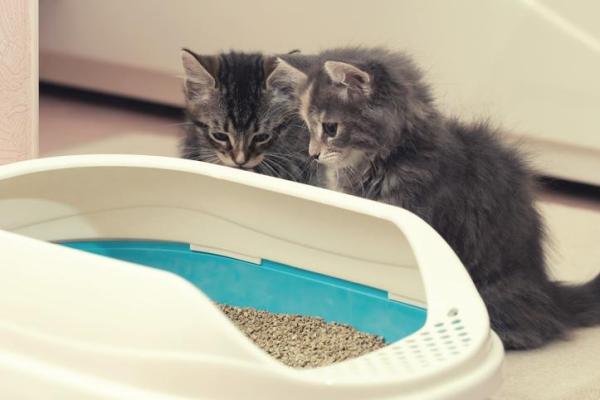Why Does My Cat Keep Pooping on the Bed?



See files for Cats
Cats are very clean animals that easily learn to use the litter box from a young age. That's why a cat pooping on the bed will surprise their companions.
In this AnimalWised article we're going to explain why your cat is pooping on your bed and the main causes and solutions to this behavioural problem. Keep reading to learn more!
Cats and their litter box
Although many cats use their litter box without any problems, it is also true that some are extremely sensitive when it comes to relieving themselves. Any alteration, even if imperceptible to us, can make the cat stop going to relieve themselves in their litter box. We can start by preventing the rejection of the litter box by respecting three fundamental keys such as:
- Size: it must correspond to that of the cat both in length and width as well as in the height of the edges. Learn more in our article about types of litter boxes for cats.
- Location: the litter box is placed in a sheltered location, away from people, other pets or noisy areas. It should also be away from their food and water.
- Cleaning: depending on the quality of the sand chosen, cleaning will be more or less frequent. Nevertheless, the litter box must be kept free of feces and urine for as long as possible.
Litter training your cat is very important and must be done as soon as you adopt them. Cats will often learn very quickly and naturally learn to relieve themselves in the litter box. If, however, you do not have the right litter box for your cat, enough of them around the house or if they are not regularly cleaned, it won't be a surprise that your cat will relieve themselves outside of the litter box.

Why is my cat pooping on my bed?
Sometimes, even respecting the above guidelines, our cat may still poop on our bed, so let's take a look at the main reasons for this behavioural issue. The first thing we need to be clear on is that your cat is not doing this to annoy you or rebel against you. This is an underlying symptom of one of the main causes we list below:
They are suffering from an underlying illness
If our cat begins to poop in our bed, the first thing to do is go to the veterinarian for a general check-up as it may be due to a health problem. For example, softer stools, diarrhea or even constipation, as well as some pain that affects defecation can lead the cat to resort to our bed as they may feel more calm, warm or safe there.
Other health issues related to this behavioural issue is intestinal parasites, inflammation, improper feeding or joint pain as this can hinder your cat's mobility, leading them to avoid the litter box. Older cats will be at greater risk of suffering from alterations in their health that can affect defecation, such as constipation or osteoarthritis. On the other hand, diarrhea is usually more common in kittens with parasite problems.
In any case, your veterinarian will carry out certain examinations to reach the proper diagnosis. This is essential to begin their treatment and correct their behavioural issue. With this being said, in addition to an underlying illness, the cat can defecate in our bed due to disorders of psychological origin or problems with the litter box. L
They have an issue with their litter box
If your cat is pooping on your bed and the vet has determined that they are completely healthy, we must first pay attention to their litter box. If you have recently made any changes to it, undo the change, as it may have caused your cat to reject it. In any case, check the following points:
- Litter: some cats reject scented and coarse-grained litters. Stick to unscented and dust-free litter and put several inches so they can scratch and bury their stools.
- Tray: while there are cats that feel comfortable in covered sandboxes, others only accept them uncovered. Watch the height of the edges, especially if your cat has mobility problems. The tray has to be big enough for them to move around in.
- Location: their litter box needs to be in an easily accessible area of your home. It should be away from any noisy or busy areas and also away from the kitchen as cats do not relieve themselves near to where they eat.
- Cleaning: not only do you have to remove their stools each day but you also need to wash the litter box using soap and water once a week or two. You shouldn't use any harsh chemicals, such as bleach, as most cats will reject litter boxes with these scents.
- Number of litter boxes: it is recommended to have two litter boxes for every cat that you have. This is especially true if you have a large apartment or a house. You should place them in accessible and calm areas around your home. Learn more in our article about how many litter boxes you should have.
With this being said, a healthy cat with an ideal litter box could also end up defecating in its keeper's bed. It may be due to causes of a psychological origin.

They are stressed
Sometimes a cat poops in our room, specifically on the bed, because they are going through a stressful situation that prevents them from approaching the litter box. These are some of the causes are the following:
- Change in routine or environment: if there has been any change in the cat's routine or environment, such as housework or the arrival of a new limb, the cat may manifest its stress through inappropriate elimination. They are very sensitive animals that are affected by changes, some of which are imperceptible to us.
- Trauma with the litter box: on the other hand, a negative experience when using the litter box, for example, being surprised by an unexpected noise, can lead the animal to look for another place to relieve themselves.
- Not enough room: in homes where several cats live together, it is necessary to ensure that none of them prevent access to resources for the rest. You need to have enough litter boxes in your home for the amount of cats you have.
- They mis-associate the litter box: perhaps the kitten has an incorrect association that leads them to not identify the litter box as the proper place to defecate, relating the act to other textures. Make sure the litter box is well located and ticks all the boxes we mentioned before.
- They are marking their territory: lastly, feces can also be used to mark their territory, although it is more common to do so with urine. This is the least common cause but may occur, especially if you have adopted a new cat.
Whatever the cause may be, it is not always easy to determine. What we can understand is that the cat that chooses to defecate on the bed because they perceive the bed as a safe place. Not only because cats usually associate the bed with a warm and cozy area where they can relax, but also because beds tend to be high up than the litter boxes, which makes cats feel safer than being on ground level.
If the behaviour continues, it's best you take your cat back to the veterinarian or even consult a feline behaviour specialist.

What do I do if my cat poops on my bed?
If your cat poops on your bed, regardless of the cause, you can follow some general recommendations to prevent it from happening again. They are the following:
- The simplest temporary solution is to prevent access to the bed by closing the bedroom door, but of course, the root of the problem still needs to be addressed.
- Clean the bed as soon as possible so that the smell does not encourage your cat to keep pooping on your bed. Use enzymatic cleaners to eliminate odours.
- If you cannot close the door, cover the bed with newspapers or plastic, as many cats find it unpleasant to step on these surfaces. This is another temporary solution.
- Lastly, never scold your cat. They are not doing this to get back at you, this is a symptom of an underlying problem. Therefore scolding them for this behaviour will only harm your relationship with them and may lead to more behavioural problems.
To find the cause and address the root of the problem we recommend you:
- Take them to the veterinarian to rule out any medical problems that may be causing this behavioural issue.
- Make sure they are comfortable in their litter box, that they have enough litter boxes around the house.
- Make sure that their litter boxes are cleaned regularly.
- Help them with their stress if they are experiencing any changes in their lifestyle.
- If the problem continues, you will need to contact a feline behaviour specialist.
If you want to read similar articles to Why Does My Cat Keep Pooping on the Bed?, we recommend you visit our Behavioral problems category.
- Lindell, Ellen. (2017). Feline House Soiling . Clinician's Brief.








